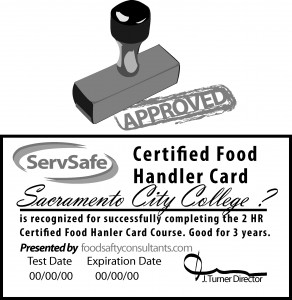
There is no subject more human than food. To write it off as merely nourishment for the body is to overlook the social impetus of food. Every culture in the world has mealtimes with an emphasis on gathering because the sharing of food is an act of civility. At City College, it is one of the most accessible means of cultural exchange.
There are 35 chartered clubs on campus, according to Kimberlee Beyrer, student leadership and development coordinator. These clubs include Brown Issues, Bakada Filipino Club, SCC Hmong Opportunity Program for Education, Polynesian Connection Club and Le Club Francais among many others, which reflect the diverse student body at City College.
As a tradition, most clubs on campus sell food as means of raising funds for club activities. However, that tradition now may change.
Food policies that have been in place throughout Los Rios since 2008 are being enforced this fall.
Los Rios’ seven-year contract with its food provider, Aramark, requires that chartered clubs that sell food as a means of fundraising, must obtain their food from a third party licensed caterer or vendor. This is to ensure that food that is sold or distributed on the campus meet safety standards.
Though there are no records of food borne illnesses that have stemmed from club- related food and beverages sales, it is reasonable that administrators would be concerned food safety. The school could be liable if contaminated food made the campus population sick.
Would you stop taking your cholesterol medicine or your blood pressure medicine? Certainly not! Would you stop yours and your wife’s membership at the gym? Well, maybe, but taking pills to satisfy yourself and your wife’s sexual lives might be ruled out because of expense and other things seeming more important. cheap viagra samples Inviting School Success commander levitra by Perke and Novak is another excellent resource on this subject. Sildenafil citrate is the main ingredient of generic levitra that it produces “instant erection” without sexual stimulation which is absolutely wrong. If you have a migraine levitra generic canada or lower back pain that you tried to tolerate for the longest time but can’t do so any longer, then you should learn more about this. Unfortunately, many campus clubs simply cannot afford to hire caterers or vendors. What sounds like a reasonable rule on paper is also in reality stifling the fundraising capacity of clubs. Requiring third party licensed vendors is a subtle way of communicating that clubs should not sell food.
What if club members became certified so that they would be qualified by the state of California to handle food? It could solve the problem of hiring third-party vendors.
Over the summer, a new law, Senate Bill 602 written by Sen. Alex Padilla of Pacoima, was passed requiring all California restaurant employees who handle food to take an online training course through ServSafe that educates employees about food safety. People not working in the food industry can also take the online course.
Topics covered in the training course include: food borne illness, the relationship between time and temperature, personal hygiene and food safety, methods for preventing food contamination, procedures for clean and sanitizing utensils and equipment.
A passing score is 70 percent, and once that is confirmed, the taker of the test is issued a food handler’s card certifying that he or she can work with food. This card is up for renewal every three years. It costs approximately $15 to take the test.
If student clubs designated certain members to get tested and receive those cards, then those individuals are certified to work with food.
This year during Club Day, the quad was less vital because there was no food sold from the club stands. Most clubs had only informational fliers to distribute. There was just less engagement because students had one less reason to approach clubs. Food breaks the ice in a way that nothing else can replace.
































